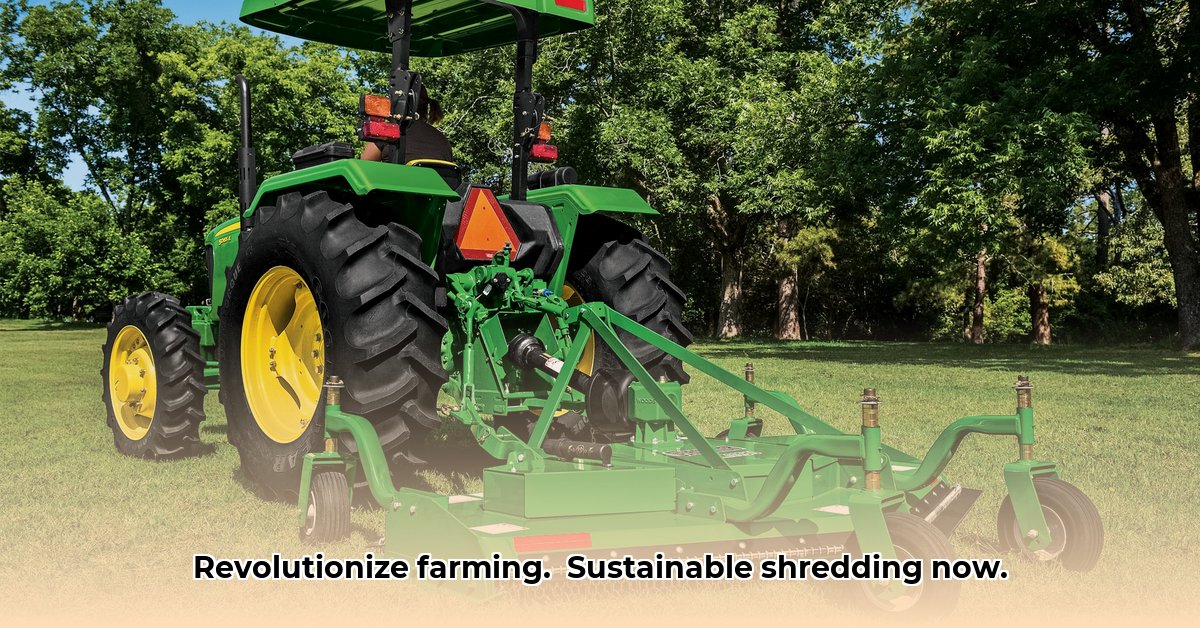
Tractor Shredder Solutions for Sustainable Farming
Sustainable agriculture demands efficient and eco-friendly practices. John Deere's tractor shredders, encompassing rotary cutters, flail mowers, and grooming mowers, play a pivotal role in achieving this goal. Choosing the right shredder is crucial; a small family farm's needs differ significantly from a large commercial operation's. This article analyzes the market, assesses sustainability impacts, and provides actionable recommendations for farmers, John Deere, and policymakers. For additional sustainable farming equipment, check out this tractor seeder.
Understanding the Tractor Shredder Market
John Deere offers a diverse range of tractor shredders tailored to various farm sizes and operations. Smaller farms might opt for the cost-effective John Deere Frontier™ series, while large-scale operations may prefer the robust Flex Cutter series, capable of handling extensive fields. Selecting the appropriate model depends on acreage, terrain, and the extent of clearing/maintenance required. Does your farm require a high-capacity shredder for vast acreage, or will a smaller model suit your needs better?
Sustainability Assessment: A Holistic Approach
Sustainability in agricultural machinery goes beyond immediate performance. It encompasses the entire lifecycle, from manufacturing to disposal. Key sustainability considerations include:
Lifecycle Assessment: This holistic view considers energy consumption during manufacturing, material sourcing, operational fuel use, and end-of-life management (recycling or disposal). A comprehensive lifecycle assessment is crucial for making truly sustainable choices. How can we minimize the environmental impact across the entire product lifecycle?
Material Sourcing: Prioritizing recycled materials and sustainably sourced raw materials (e.g., responsibly-sourced steel alloys) directly reduces the environmental footprint. Are manufacturers prioritizing sustainable material sourcing in their production processes?
Fuel Efficiency: Fuel costs significantly impact farming expenses. Fuel-efficient shredders save money and reduce greenhouse gas emissions. Precision agriculture technologies, optimizing cutting schedules and machine operation, contribute to minimizing fuel consumption. What innovative approaches are being developed to improve fuel efficiency further?
End-of-Life Management: Designing shredders for easy disassembly and recycling minimizes waste sent to landfills. Is the end-of-life plan for these pieces of equipment effectively minimized?
Actionable Recommendations: A Multi-Stakeholder Approach
Achieving sustainable farming practices requires collaboration among farmers, manufacturers, and policymakers:
For Farmers:
Small Farms: Explore cost-effective models and investigate government subsidies to offset the initial investment in sustainable machinery.
Large Farms: Analyze the long-term return on investment (ROI) by considering the total lifecycle cost (TLC). Invest in precision agriculture technologies to optimize fuel consumption and efficiency.
For John Deere (and other manufacturers):
Short-Term: Conduct thorough lifecycle assessments for all models to pinpoint areas for improvement and enhance transparency for consumers.
Long-Term: Design shredders with modularity for easier repairs and extended lifespan. Research and develop alternative energy sources such as hybrid or electric power to reduce reliance on fossil fuels.
For Policymakers:
Short-Term: Implement financial incentives (subsidies) to encourage farmers to adopt fuel-efficient and recyclable equipment.
Long-Term: Develop standardized methods for reporting sustainability metrics across all agricultural machinery to promote better comparison and support R&D for truly eco-friendly technologies.
A Closer Look: Model Comparison and Sustainability
Choosing a sustainable shredder requires comparing various models:
| Model Type | Pros | Cons | Sustainability Considerations |
|---|---|---|---|
| Frontier™ (Light Duty) | Affordable, easy maintenance, suitable for smaller farms | Shorter lifespan, limited heavy-duty capability | Prioritize lifecycle cost and easy recyclability. |
| Flex Cutter (Heavy Duty) | High durability, efficient for large-scale operations | Higher initial cost, potential for higher fuel consumption | Emphasize lifetime costs and explore fuel-efficient options & recyclability. |
The future of farming hinges on integrating sustainability into every aspect. Informed decisions regarding tractor shredders are crucial for building a more efficient and environmentally friendly agricultural system. How can we further enhance the sustainability profile of these essential agricultural tools?